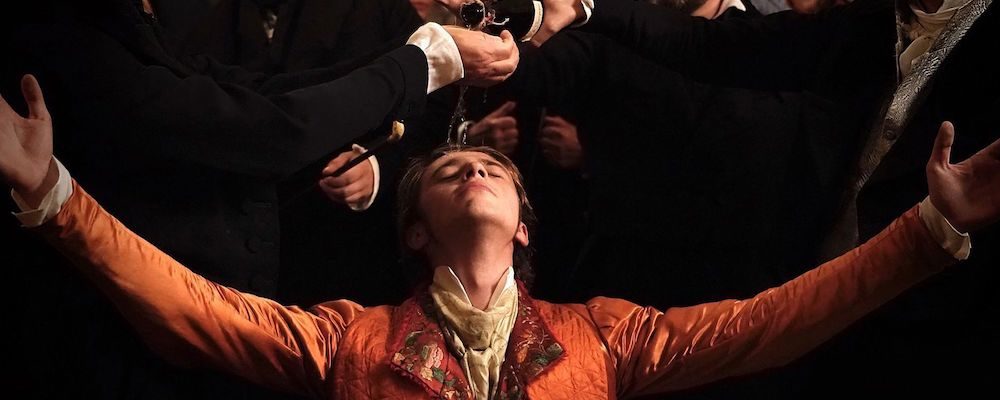‘Lost Illusions’ Sumptuously Adapts Balzac’s Tale of a Writer’s Ascendance Through Scandal and Desire
Alci Rengifo
It is one of the oldest story arches in literature. The underdog who strives for success without noticing the way fate can twist a cruel knife into your back. Honoré de Balzac had no qualms about depicting society as it truly was, sometimes utilizing vicious satire and other times elegant, biting observations. The French master casts a shadow over all authors who have observed the finer details of how we are who we are. Xavier Giannoli’s “Lost Illusions” is one of those rare cases where an author like Balzac is successfully adapted to the screen with the alluring force of good filmmaking, while never losing touch with the original work’s essence. Giannoli tells a riveting story while paying attention to the details of what motivates the characters as social animals.
The opulent setting is 19th century France undergoing the restoration of its monarchical glory days. The aristocrats wish to forget about the French Revolution, The Terror that lopped off their heads, and subsequent Napoleonic wars. They once again rule supreme. In a rural town in southwestern France, Lucien Chardon (Benjamin Voisin) is an aspiring poet carrying on an affair with a married aristocrat, Madame Louise (Cécile de France). Louise truly believes in Lucien’s talent, but when their relationship is uncovered, they flee together to Paris. Instantly, the viciously refined social codes of the upper classes crush their hopes. Lucien claims he has noble lineage from his mother, who was an impoverished aristocrat. This doesn’t matter to someone like Louise’s cousin, Marquise d’Espard (Jeanne Balibar), a queen of gossip circles and quick judgements. When Louise breaks off the affair, Lucien tries to make a living serving tables. Here, he comes across Etienne Lousteau (Vincent Lacoste), the hashish-smoking editor of a small but influential liberal paper, The Corsair. Lucien soon becomes intoxicated by the excited, emerging world of cutthroat journalism, where the famous buy favors from wordsmiths and scandal sells.
Balzac originally wrote “Lost Illusions” between 1837 and 1843 as a three-part serial, which today is sold in your typical classics section as quite a hefty volume. Giannoli gives the story enough space 2 hours and 29 minutes, yet it’s never less than stirring. With cinematographer Christophe Beaucarne, Giannoli crafts a sumptuous environment that evokes the past but never feels stuffy. He’s not treating this like a Penguin Classics book to film, but like a feverish story about heartbreak, brutal social codes and the excitement of journalism. In a sense “Lost Illusions” is about the dawn of a medium. Lucien is introduced by Etienne into a world of salons where writers debate with crackling wit. It’s a terrain where the sharpest comeback wins. Rising authors like the enigmatic Nathan d’Anastazio (Xavier Dolan) are backed by publishers like Dauriat (the legendary Gérard Depardieu) who will pay papers to create scandals in order to stir some controversy (and sales). Any working critic will devilishly grin at a scene where Etienne teaches Lucien how to pretend one has actually read an assigned book for review.
The darker side of this tale is the eventual allure of fame and power that comes with rising as a critical star. Lucien becomes so enveloped in what essentially amounts to tabloid reporting, that the poet who once sought to become a great author almost disappears. He falls in love with a stage actor, Coralie (Salomé Dewaels), a devoted partner willing to endure poverty and any other challenge with the wordsmith. As other films like Pietro Marcello’s “Martin Eden” have reminded us, the power of words brings with it the same temptations as any other forms of glory. As Lucien rises, so does his ego and expenses. He can not only extract revenge on the social class that rejected him, but can threaten to overshadow the very friends who introduced him into this world. Thrillingly, we follow every step of his rise and flirtation with disaster. With rich décor and luminous photography, Giannoli immerses us in another time and swerves away from the plot to focus on some fascinating details, like a man who accepts bribes to plan either applauses or booing at theatrical performances. And like Martin Scrosese’s “The Age of Innocence,” enough intensity and even violence is contained in how the wrong nod or gesture can doom a reputation.
With performances of this caliber we never feel the running time. Benjamin Voisin deftly transforms before us from a penniless poet to a cocky journalist slinging phrases like darts. Vincent Lacoste eats the scenery as the witty, cynical Etienne, who constantly puffs a pipe of hash but would never dream of selling out his liberal principles to please the rotten monarchists. Their performances along with the entire technique and writing deliver a period piece that feels contemporary. Balzac raises the tough question of whether even a critic comes with a price. “Lost Illusions” reminds us there can still be grand films about individuals’ thinking. It’s a drama where the quickest wit might survive the verbal battles of the salons. The tragedy of Lucien is that even this can’t be enough for a restless soul who needs to conquer everything in order to prove they can. This is why the classics endure, because the best ones understand how human desire and folly are the most riveting plot tools of all.
“Lost Illusions” releases June 10 in select theaters.

